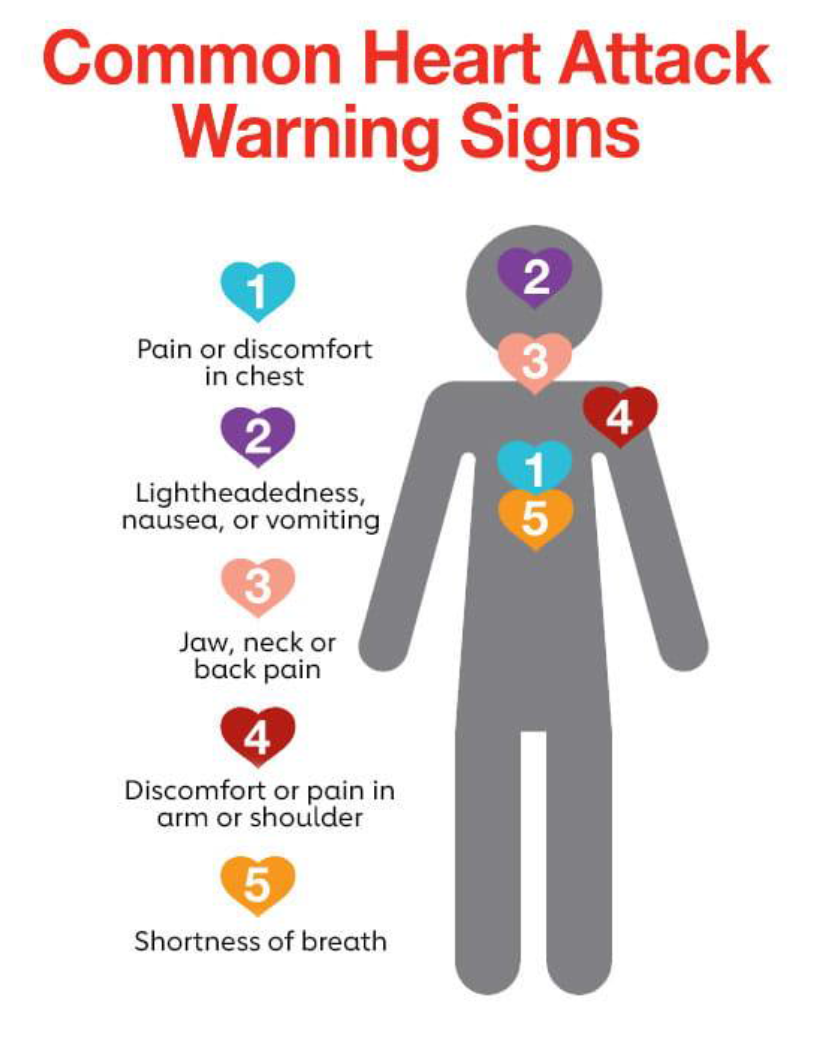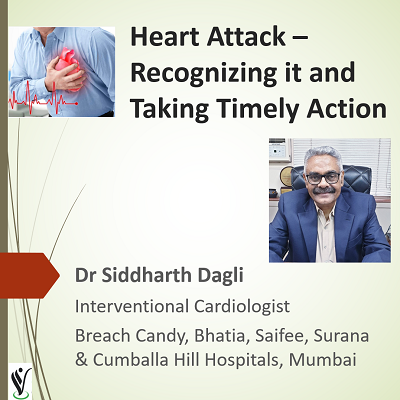A heart attack can occur anywhere, and it is important that both the person suffering the attack and the people around are aware of recognizing and taking timely action so that medical help and intervention are not unduly delayed.
WHAT ARE THE SIGNS AND SYMPTOMS OF A HEART ATTACK?
The major symptoms of a heart attack (technically called myocardial infarction) are
- Chest pain or discomfort: Most heart attacks involve discomfort in the center or left side of the chest that lasts for more than a few minutes or that goes away and comes back. The discomfort can feel like an unpleasant pressure, squeezing, fullness, heaviness, or pain.
- Feeling light-headed, or weak/faint, sometimes with nausea and even vomiting.
- Pain or discomfort in the jaw, neck, or back.
- Pain or discomfort in one or both arms or shoulders.
- Shortness of breath: This often comes along with chest discomfort, but can also sometimes happen before chest discomfort.
- Breaking out into a cold sweat
- Confusion, anxiety, restlessness, and a sense of impending doom
- Feeling like ‘gas, acidity, or indigestion’: Many Indian patients just complain of “gas” and acidity, and are often treated as such with valuable time lost.



EMERGENCY CARE FOR A HEART ATTACK WHEREVER YOU ARE
Call your local medical emergency number
Don’t ignore or attempt to tough out the mentioned symptoms of a heart attack for more than 5 minutes. If you don’t have access to emergency medical services, call and have a neighbor or a friend drive you to the nearest hospital. Drive yourself only as a last resort, and realize that it places you and others at risk when you drive under these circumstances.
If you witness someone having symptoms that could possibly be of a heart attack, call for an ambulance immediately, or drive the person to the nearest hospital emergency. It is good to have one other person support the patient in the vehicle, who calls and sounds off the nearest hospital while the other does the driving.
About taking medicines
Always seek emergency help first, such as calling an Ambulance or talking to a qualified Cardiologist. Rush to the nearest Hospital where Emergency Medical Services are available.
You could take or administer the following medicines:
Aspirin 325 mg to be chewed and swallowed immediately, along with 300mg of clopidogrel and 80 mg of atorvastatin or 40 mg of rosuvastatin.
Nitroglycerin can be taken if prescribed. If you think you’re having a heart attack and your doctor has previously prescribed nitroglycerin for you, take it as directed. Do not take anyone else’s nitroglycerin, because that could put you in more danger.
Make sure you are NOT allergic to the above-mentioned drugs.
CPR
Begin CPR (chest compressions) if the person is unconscious.
If you are with a person who might be having a heart attack and he or she is unconscious but are not trained in CPR, doctors recommend skipping mouth-to-mouth rescue breathing and performing only chest compressions (about 100 per minute).
The average person waits 3 hours before seeking help for symptoms of a heart attack. Many heart attack patients die before they reach a hospital. The sooner the person gets to the emergency room, the better the chance of survival. Prompt medical treatment reduces the amount of heart damage.
First Aid
If you think someone is having a heart attack:
- Have the person sit down, rest, and try to keep calm.
- Loosen any tight clothing.
- Ask if the person takes any chest pain medicine, such as nitroglycerin for a known heart condition, and help them take it.
- If the pain does not go away promptly with rest or within 3 minutes of taking nitroglycerin, call for emergency medical help.
- Check if the person is breathing by keeping your finger near the person’s nose to feel their breath. If the patient is not breathing, start giving chest compression and intermittent mouth-to-mouth respiration if possible. If the person is unconscious and unresponsive, call the nearest Hospital emergency number, then begin CPR.
Important points
- DO NOT leave the person alone. call for help while watching him constantly.
- DO NOT allow the person to deny the symptoms and convince you not to call for emergency help.
- DO NOT wait to see if the symptoms go away.
- DO NOT give the person anything by mouth unless a heart medicine has been prescribed.
WHAT IS GOLDEN HOUR?
Time is most important. The first hour after the onset of a heart attack is called the golden hour.
Appropriate action within the first 60 minutes of a heart attack can reverse its effects. 50% of people with Heart Attack die before reaching the Hospital.
This concept is extremely important to understand because most deaths and cardiac arrests occur during this period.
However, if the person reaches the hospital and gets treated within this period s/he can expect near-complete recovery after a successful Primary Angioplasty.
Window of opportunity
The Golden Hour is a window of opportunity that impacts a patient’s survival and quality of life following a heart attack. It is a critical time, and time is a muscle. This is because the heart muscle starts to die within 80-90 minutes after it stops getting blood, and within six hours, almost all the affected parts of the heart could be irreversibly damaged. So, the faster normal blood flow is re-established, the lesser would be the damage to the heart.
To reduce the damage, it is important to get to the hospital as soon as possible. Other than the consequences of a damaged heart muscle, the most common killer in the early period is abnormal heart rhythms called ventricular tachycardia and ventricular fibrillation where the heart muscles contract at a rapid rate, but no effective pumping of blood from the heart takes place. This is why once the person reaches a medical facility (ambulance or hospital), they are immediately put on an ECG monitor to assess the heart rhythm so that they can be given prompt treatment in case of an abnormal rhythm, which could be delivering a shock (Cardioversion) or administering certain medication.
HOW DO YOU MANAGE A HEART ATTACK IN THE CURRENT ERA?
A heart attack is caused when a clot completely blocks a blood vessel in the heart. It is a complication of cardiovascular disease (CVD). The primary aim is to get rid of this clot as soon as possible; otherwise, that part of the heart dies. Even if there is a slight suspicion that the symptoms could be of a heart attack, chew a 325mg of aspirin tablet immediately as mentioned, as it helps dissolve the clot.
Once you are at the hospital, the doctors will try to get rid of the clot, either with the help of a very powerful clot buster medicine [thrombolytic medicines] or with a procedure called primary angioplasty.
Primary angioplasty is the preferred therapy in most scenarios. In primary angioplasty, a diagnostic coronary angiogram is performed immediately to identify the site of blockage and angioplasty is performed and a stent (metallic scaffold) is deployed in the artery to open up the blood flow. The only prerequisite is that it can be done only in hospitals where a ‘Cardiac Cath Lab’ is available so that this also gets initiated simultaneously.
POINTS TO REMEMBER AND BE PREPARED
- Always keep the contact numbers of ambulances and nearby hospitals, and an interventional cardiologist stored in your cell phone so that you can call them in case of need.
- Try to reach the nearest hospital which has cath lab facilities, as early as possible.
- Go preferably by a cardiac ambulance.
- Do not drive yourself as you could harm yourself as well as others.
- Call the hospital helpline; so that the system can be activated even before the patient reaches the hospital.
PREVENT THE ATTACK
It is always best to prevent such an event from happening. For that, leading a heart-healthy lifestyle is important. All the risk factors for heart disease like high blood pressure, diabetes, high cholesterol, obesity, sedentary lifestyle, and smoking, are silent killers as they do not produce uncomfortable or typical symptoms and are hence are neglected by most of us. Getting regular medical check-ups by your family physician, and also by an expert cardiologist at regular intervals is recommended.
Dr. Siddharth Dagli (MD FCSI FICA FCCP FISE), is an acclaimed interventional cardiologist at Breach Candy, Bhatia, Saifee, Cumballa Hill and Surana Hospitals, in Mumbai. He has done acclaimed work in the field of Myocardial Infarction and Coronary Angioplasty. He is committed to increasing public health awareness of heart attack and cardiac events.
Dr Dagli is a tech savvy personality, also well known for his love for music especially passionate singing and indepth knowledge of the game of Cricket.
Further reading:
Cardiovascular Disease (CVD) – Understanding Atherosclerosis and Coronary Artery Disease


